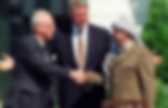

Juan Cole: Logical Errors in GOP Debate on the Middle East. Photograph via Flickr by IowaPolitics.
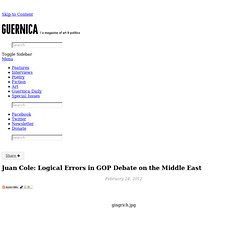
Why Gingrich’s claims are fallacies and card-stacking. By **Juan Cole** By arrangement with Juan Cole. Bush Was Right - By Gary C. Gambill. When mass demonstrations began spreading across the Arab world early last year, conservative commentators lost no time in singing the praises of George W. Bush, the first U.S. president to aggressively push for democratization in the region. Today, with Islamists dominating politics wherever tyrants have stumbled or fallen, many of those who waxed eloquent about Bush's Freedom Agenda have either fallen silent or taken to arguing that Islamist ascendancy will prove to be a temporary setback on the road to liberal democracy.
Those who were critical of it all along are having a field day. Colin Powell on the Bush Administration's Iraq War Mistakes. State Department exempts 11 countries from Iran sanctions. The State Department announced on Tuesday that it would exempt 10 European countries and Japan from penalties for doing business with Iran's central bank, because those countries are making significant progress toward weaning themselves off of Iranian oil.

"I am pleased to announce that an initial group of eleven countries has significantly reduced their volume of crude oil purchases from Iran -- Belgium, the Czech Republic, France, Germany, Greece, Italy, Japan, the Netherlands, Poland, Spain, and the United Kingdom. As a result, I will report to the Congress that sanctions pursuant to Section 1245 of the National Defense Authorization Act for 2012 (NDAA) will not apply to the financial institutions based in these countries, for a renewable period of 180 days," Secretary of State Hillary Clinton said in a Tuesday statement.
"The actions taken by these countries were not easy. Sen. Struggles with Iran for influence in Iraq - By Josh Rogin. The first major test of U.S. post-war influence in Iraq is now raging over efforts to stop Iran from funneling arms to Syria through Iraqi airspace, but the Iraqis are either unwilling or unable to assure the United States the shipments will cease.

Last week, the Washington Times reported that the Iraqi government was refusing to halt Iranian cargo flights to Syria that fly over Iraqi airspace, despite the fact that U.S. officials believe the flights carry massive and illegal shipments of arms to aid President Bashar al-Assad's regime, which is murdering civilians by the thousands in its struggle to keep power. Publicly, Iraqi Prime Minister Nouri al-Malikihas stated the shipments contain "humanitarian goods, not weapons. " However, U.S. officials aren't buying that excuse, and have been repeatedly pressing Maliki behind the scenes to make Iran halt the arms shipments, with limited if any success.
"The Iraqi government is trying to cooperate. News Desk: Our Men in Iran? From the air, the terrain of the Department of Energy’s Nevada National Security Site, with its arid high plains and remote mountain peaks, has the look of northwest Iran.

The site, some sixty-five miles northwest of Las Vegas, was once used for nuclear testing, and now includes a counterintelligence training facility and a private airport capable of handling Boeing 737 aircraft. Obama Ordered Wave of Cyberattacks Against Iran. "Disarmament Wars" by Jonathan Schell. Exit from comment view mode. Click to hide this space NEW YORK – On April 13, Iran is scheduled meet with representatives of China, France, Russia, the United Kingdom, and the United States – the permanent members of the United Nations Security Council – plus Germany (the so-called “P5+1”) in an effort to decide the fate of Iran’s nuclear program.
Meanwhile, North Korea is reportedly preparing its third nuclear test, as if to provide a discordant sound track for the talks. If the talks fail, and military action against Iran becomes more likely, no one should be surprised. Over the past decade, a new kind of war has been invented: a war designed to stop a country from obtaining nuclear weapons or other weapons of mass destruction (WMD). America's war on Iran: the plan revealed. The United States is more seriously preparing for military action against Iran than is widely realised.
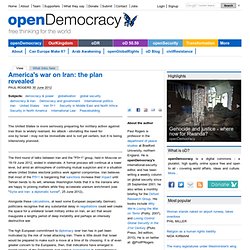
An attack - obviating the need for one by Israel - may not be immediate and is not yet certain, but it is being intensively planned. The third round of talks between Iran and the "P5+1" group, held in Moscow on 18-19 June 2012, ended in stalemate. A formal process will continue at a lower level, but amid an atmosphere of continuing mutual suspicion and in a situation where United States electoral politics work against compromise. Obama to Iran and Israel: 'As President of the United States, I Don't Bluff' - Jeffrey Goldberg - International. Dismissing a strategy of "containment," the president tells me it's "unacceptable" for the Islamic Republic to have a nuclear weapon.
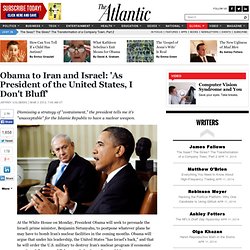
At the White House on Monday, President Obama will seek to persuade the Israeli prime minister, Benjamin Netanyahu, to postpone whatever plans he may have to bomb Iran's nuclear facilities in the coming months. Obama will argue that under his leadership, the United States "has Israel's back," and that he will order the U.S. military to destroy Iran's nuclear program if economic sanctions fail to compel Tehran to shelve its nuclear ambitions. Iran Is the Great Distraction - By David Rothkopf.
Iran has called America the Great Satan.

Israel has called Iran an existential threat. For both the United States and Israel, whose leaders are meeting Monday to discuss how to handle Tehran's nuclear program, Iran should be called the Great Distraction. By focusing on Iran, indeed by having some among Israel's top leaders seemingly obsessed about it, Israel is ignoring (or seeking an excuse to ignore) the real existential threats on and within its own borders -- demographic, social, and economic. By allowing Iran to occupy too much bandwidth, American leaders have also taken their eye off the ball. There are far greater national security threats and opportunities that require attention right now, from fixing the broken U.S. economic model to exploring the potential for a sound energy policy in order to both strengthen that economy and dramatically reduce the leverage and thereby the relevance of regimes like the one in Tehran.
How the U.S. and Iran Keep Failing To Find a Peace They Both Want - Trita Parsi - International. A grand bargain would serve everyone, which is why both countries have tried to put aside tensions and strike a deal.
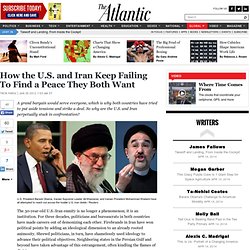
So why are the U.S. and Iran perpetually stuck in confrontation? U.S. President Barack Obama, Iranian Supreme Leader Ali Khamenei, and Iranian President Mohammad Khatami have all attempted to reach out across the hostile U.S. Backed Into a Corner - By Hossein Mousavian. The Obama administration has done more to undermine Iran over the past three years than any U.S. presidency in the 33 years since the Iranian revolution.

Under the shadow of a policy of "engagement," the United States and Israel have led a campaign of economic, cyber, and covert war against Iran. Yet this coercive approach, conducted along with sporadic negotiations on nuclear issues between Iran and the P5+1 group of China, France, Germany, Russia, the United Kingdom, and the United States has failed to resolve the future of Iran's nuclear program. The primary issue is mistrust. American and Western politicians continuously reiterate their mistrust of Tehran but seem not to understand that this mistrust is mutual.
Iran and the United States Face Off in Turkey. As U.S. and Iranian officials prepare to face off in Istanbul this weekend to negotiate the future of Iran's nuclear program, stakes are high and expectations are low.
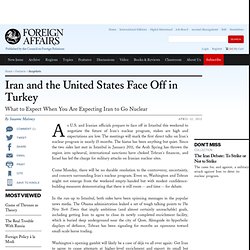
The Magazine - We Can Live with a Nuclear Iran. March/April 2012We Can Live with a Nuclear Iran Fears of a bomb in Tehran’s hands are overhyped, and a war to prevent it would be a disaster. By Paul Pillar At around 8:30 in the morning on Wednesday, January 11, while much of Tehran was snarled in its usual rush-hour traffic, a motorcyclist drew alongside a gray Peugeot and affixed a magnetic bomb to its exterior. The ensuing blast killed the car’s thirty-two-year-old passenger, Mostafa Ahmadi Roshan, a professor of chemistry and the deputy director of Iran’s premiere uranium enrichment facility. Juan Cole, The Iran Conundrum. Understanding Iran's diplomatic strategy. Washington, DC - In January 2009, just before Gary Samore left his position as Vice-President for Studies at the Council on Foreign Relations, he summed up his rather cynical view of how Iran would conduct negotiations. "The logical position the Iranians are bound to take," he wrote in a post on the Council's website, "is: 'We're happy to talk forever, as long as we can keep building centrifuges.'" A few days later, Samore was named President Barack Obama's top adviser on nuclear proliferation, making him one of the most influential figures in the administration with regards to diplomacy toward Iran.
The strategy he attributed to Tehran of using negotiations to "play for time" while advancing to the goal of enough enriched uranium for nuclear weapons has been clearly expressed in recent statements by Obama and other senior administration officials in anticipation of new nuclear talks with Tehran. Netanyahu and Obama play high-stakes poker over Iran. "Keeping Cool in the Nuclear Heat" by Gareth Evans. Exit from comment view mode. Click to hide this space CANBERRA – Perhaps it is going too far to say, as someone did after the Gulf of Mexico oil spill two years ago, that most Americans want a president who is cool, calm, and collected in a crisis – except when there is a crisis.
But of all the charges thrown at President Barack Obama by his domestic political opponents, the hardest for most outsiders to accept is that he is too emotionally disengaged: all brain cells and no red-blood cells. Is Israel REALLY a "Strategic Asset?" Last week the Washington Institute of Near East Policy released a brief report entitled "Israel: A Strategic Asset for the United States. " Friendship Under Fire - By David Makovsky. Next month, U.S. President Barack Obama and Israeli Prime Minister Benjamin Netanyahu will hold a key meeting over the Iranian nuclear challenge that will test their sometimes rocky relationship.
After a weekend visit by National Security Advisor Tom Donilon to Israel, the White House announced this week that Obama will host Netanyahu in Washington on March 5. Peter Beinart: Obama Betrayed Ideals on Israel. Beinart Fires Back. America's Israel Obsession - By Shmuel Rosner. In mid-December of last year, Israeli Prime Minister Benjamin Netanyahu, "with all due respect," declined a request to write an op-ed for the New York Times.
In his rejection letter, Netanyahu's senior advisor, Ron Dermer, claimed to have counted up Times (and International Herald Tribune) articles and concluded that of the 20 articles related to Israel published between September and November 2011, 19 portrayed Israel in a negative light. This Week at War: Rules of the Game - By Robert Haddick. On March 19, the New York Times described a classified U.S. Central Command war game conducted this month that simulated the outcome of an Israeli attack on Iran. The Second-Term Illusion - By Aaron David Miller. It's 2013. Six Big Lies about How Jerusalem Runs Washington - By Aaron David Miller. US seeks extra $70m for Israel defence shield - Americas. AIPAC, Israel, and the Hypocritical Claim of Backing a Two-State Solution.
That time slot after the local news doesn’t matter. News Desk: The Emergency Committee for Israel Cries Wolf. MJ Rosenberg: Why Peter Beinart's Book Is Driving the "Pro-Israel" Establishment Crazy. Zionism is the Problem. How Obama Missed an Opportunity for Middle East Peace - By Steven White and P.J. Dermer. Separate Justice System for Muslims. Tongue-cutting at Al Jazeera - Glenn Greenwald. Beware the American Muslim Vote. The Libyan precedent is not a hopeful one for Syria. Losing Egypt. What Obama should say when Kurdistan's President Masoud Barzani visits Washington. America, Oil, and War in the Middle East.